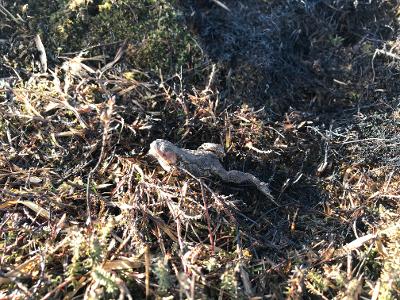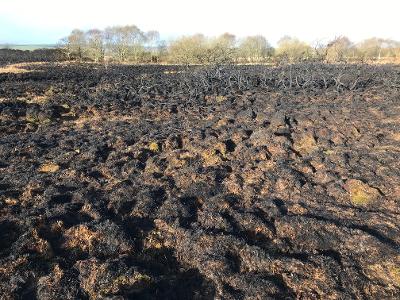Dorset Wildlife Trust (DWT) is sad to announce that on the evening of Sunday 5th April a fire on Winfrith Heath nature reserve in Dorset destroyed 1.2 hectares of wildlife habitat, equivalent to the size of roughly 2 football pitches.
5 fire crews and 3 fire engines from Dorset & Wiltshire Fire andRescue were in attendance to fight the fire. The source of the fire is unknown, although southerly winds and dry ground would have made the area more susceptible to fire taking hold. Whether it was done deliberately or through neglect has not yet been established.
Dorset Wildlife Trust’s Chief Executive, Brian Bleese, said “A fire on a nature reserve at any time of year is devastating for wildlife, but spring is a key time with the bird nesting season beginning in March, so this is especially worrying. We are also concerned for the safety of visitors on the site. We are very grateful to Dorset & Wiltshire Fire and Rescue for acting so swiftly to try and save as much habitat as possible but the fact remains that possibly hundreds of animals and plants have perished in this fire, and the damaged habitat will make it harderfor the surviving species to thrive on.”
Dorset & Wiltshire Fire and Rescue service’s Tactical Wildfire Officer, Andy Elliott said, “It is a great shame to have to attend these incidents. The nature reserves are beautiful places and they contain some very special wildlife. Unfortunately, many of these fires are either deliberate or through carelessness. Please take great care when visiting the countryside and only do so if the site is close to your home. Stay at Home, protect our Emergency Services and Save Lives.”
Andy added, “Incidents such as these put firefighters under additional threat from COVID-19 because it brings many people together to fight these fires. If you have to visit the countryside please be considerate and do all you can to protect our Emergency Services.”
Winfrith Heath nature reserve is a haven for rare and threatened wildlife and is home to all 6 species of reptile, including the UK’s rarest reptiles, the sand lizard and smooth snake.

Ground nesting birds such lapwings and skylarks and the rare Dartfold Warbler can also be found here, along with common heather, meadow thistle and the rare bright blue marsh gentianwildflower. Cattle are grazing for most of the year on the site.
Dorset Wildlife Trust is pleading with the public to use nature reserves responsibly during the Covid-19 crisis. This includes adhering to social distancing whilst on a nature reserve, keeping dogs on leads and returning another time if the nature reserve is busy. We’re also asking that on nature reserves where cattle are present, care is taken to close gates (using gloves), to stop cattle escaping.
For more advice about using nature reserves for daily exercise, visit www.dorsetwildlifetrust.org.uk/news.













Hi, just required you to know I he added your site to my Google bookmarks due to your layout. But seriously, I believe your internet site has 1 in the freshest theme I??ve came across. It extremely helps make reading your blog significantly easier.
Wow, wonderful blog layout! How long have you been blogging for? you make running a blog glance easy. The total glance of your web site is wonderful, as neatly as the content material!
I’ve been absent for some time, but now I remember why I used to love this website. Thanks, I will try and check back more often. How frequently you update your website?
Hello there, just become aware of your weblog through Google, and found that it’s truly informative. I’m gonna watch out for brussels. I will appreciate if you continue this in future. Lots of other folks can be benefited out of your writing. Cheers!
Thank you for the sensible critique. Me and my neighbor were just preparing to do some research on this. We got a grab a book from our area library but I think I learned more clear from this post. I’m very glad to see such magnificent info being shared freely out there.